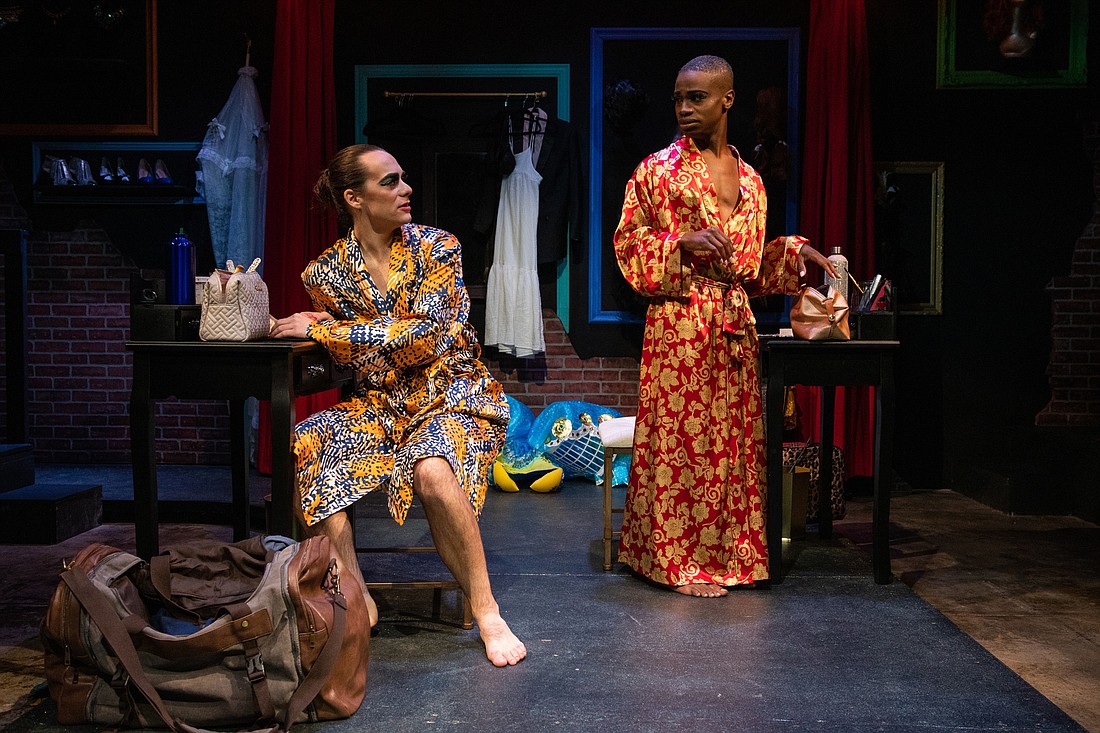- January 12, 2025
-
-
Loading

Loading

Drag performance is pretty mainstream these days. Terry Guest’s “At the Wake of a Dead Drag Queen” recalls a fairly recent time when it wasn’t. It’s Urbanite Theatre’s first live production since the pandemic lockdown. It proves the edgy theater is as sharp as ever.
The time is probably the early 2010s. The place is a cramped nightclub in a small town in Georgia. It’s a coming-of-age story — more accurately, a not-coming-of-age story. Courtney (Anthony Knighton on his driver’s license) is the play’s eponymous drag queen who has contracted HIV/AIDS in a rural backwater where life-saving drug cocktails are hard to come by if you’re poor and uninsured. Courtney’s only 22 years old — and the clock stops at age 23.
Courtney (Donovan Session) is an African-American who forms a backstage romance/friendship with Vickie (aka Hunter—portrayed by Shea Petersen), a white performer who’s also HIV positive and a drag newbie. The two share gossip and trade secrets. Courtney’s “flamboyant” in a way that can still get you killed in the South. Vickie isn’t — except when on stage. One character thinks, “How can I play it safe?” The other wonders, “What can I get away with?” Courtney pushes Vickie to take more risks and stop holding back. But Courtney is also whistling in the dark. Their clock is running down, and they’re trying to outrun it. In the end, that death sentence kills Courtney’s last chance of a real relationship. This is a very funny play, don’t get me wrong. But, at heart, it’s a tragedy.
Director Damian Lockhart leans into the performative aspect of drag. It’s a show within a show — and a down-and-dirty show at that. (“At the Wake of a Dead Drag Queen” is the play’s title, after all. What did you expect?)
Session initially portrays Courtney/Anthony as an unstoppable ball of energy. (The character’s dirty dancing unfolds in the early days when AIDS symptoms can be hidden.) The Courtney persona flirts, jokes and interacts with audience members — and dances up a storm. In Session’s portrayal, Courtney’s dance moves are clearly a form of denial. But death is what they’re denying. They’re defiantly alive and kicking.
Shea Petersen’s Vickie/Hunter character is more of a ball of insecurity. One who grew up in a strict fundamentalist household that considered homophobia to be Biblical doctrine. Vickie’s in touch with their feminine side on stage. Backstage, they’re out of touch. (In Petersen’s portrayal, Vickie's also clearly in love — and hurt.) Courtney shares professional tips — when not teasing Vickie mercilessly.
This analysis sounds a sociology lecture. But “At the Wake of a Dead Drag Queen” is more like a party. Or Alice’s experiences on the other side of the looking-glass. A host of talents, including scenic designer Jeff Webber, costume designer David Covach, and wig designer Susan Haldeman do a great job pulling you into this mirror world.
And that’s an accurate reflection of what you’ll experience at the Urbanite.
Guest’s play really is a hall of mirrors dealing with self-image and the presentation of self. In the world according to Guest, identity is not a binary equation of straight/gay or white/black. It’s the more like algebra — a complicated derivative equation with many dependent, intersectional variables. How do you crack that code? Empathy alone can do it. Listen, understand, put yourself in somebody else’s shoes. If they’re high-heeled shoes, so be it.
The playwright doesn’t frame this as a hand-wringing plea for outsiders to understand the drag subculture. Guest places the dilemma in the hearts of the characters within that culture. They have a hard time empathizing with each other — let alone themselves.
That’s the heart of the play’s tragedy.
Not Courtney’s death. Their wasted opportunities while they’re still breathing.
Vickie offers Courtney a shot at real love in Courtney's final days. But Courtney would have to drop barriers and be totally honest. Letting Vickie in would mean facing the fear of death. Courtney just can’t do it — and drives Vickie away in their final weeks.
A sad story, yes. But the bulk of the play is a celebration of the Courtney character’s life. It’s a wake after all. Guest based the play on the real-life experience of his uncle. The playwright wanted his uncle’s story to be remembered. After seeing this powerful play, you will.